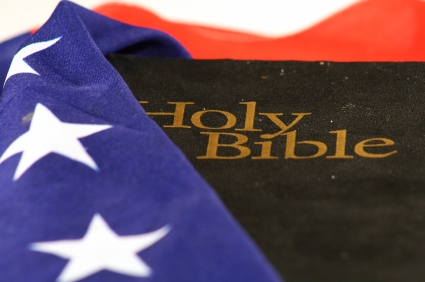Religious Doctrine in Politics is Not a Conservative Principle

The simple truth about many who call themselves small government conservatives is that they favor neither small government nor conservative principles. A case in point is the recent Rasmussen survey finding that 68 percent of Americans support a National Day of Prayer. Why not a National Day of Atheism?
Self-interest, not conservatism, drives ideas like a National Day of Prayer. Is prayer a principle of conservatism, liberalism or libertarianism? I hope we could reach agreement that no political principle drives personal religious preferences. But the way political parties have pandered to religion in recent years, you’d think God himself was being recruited for political duty.
Small government, conservative principles should focus on issues on which the state can and should act. The idea that “there are no atheists in foxholes,” doesn’t imply that religion is integral to national security. And the fact that the Constitution provides for free and open practice of one’s religion unfettered by the state does not imply that the state has a right or responsibility to promote the generic idea of praying.
An example of religious views driving political decisions is the recent dismissal of Richard Grenell as a foreign policy spokesman for Mitt Romney’s campaign. Grenell is clearly a committed conservative with a record of excellence in his role. Yet the so-called Christian community rose up against this gay man playing any role whatsoever in “their” political party. What intrusive nonsense. A truly conservative society operates as a meritocracy in which religious litmus tests simply play no role. Could a spokesperson be effective while his belief system was Buddhist or Hindu? Could he be effective if he had ever had a sexual affair outside of marriage? Taken to its ends, religious principles imposed on politics equates to an inquisition, which is exactly what happened in the case of Ric Grenell.
For reasons that still elude me, ownership of religion has morphed from a liberal principle in the 1960s (the era of the Fathers Berrigan, the Reverend Martin Luther King and other leaders of protest movements) to a conservative principle in the 2000s. In other words, religion in politics is more about fads than facts, more about contrivance than constitutionality.
I consider my personal religious beliefs to be just that – personal. They may be sacred to me, but that does not require me to proselytize them to others or insist that those I support politically must believe what I believe. Religious belief is not a political system, and if we decide to make it so, then we are no different than countries that run their courts on the basis of religious “law.” When conservatives argue that they fear the takeover of our country by Muslim Sharia law, they fail to see the hypocrisy of supporting laws based on Christianity.
Nothing is more galling to me than the argument that “this is a Christian nation.” America is a nation that welcomes all religions and non-believers as well, because we are not a nation based on any particular religious doctrine. The nation was founded in part on the basis of religious freedom – not religion. The Pilgrims wanted to be free to practice their form of Protestantism unfettered by the state’s official religious dictates. If we declare this to be a Christian nation, then we might as well tell non-Christians that they are second-class citizens.
If that’s what so-called conservatives believe, then they are not in tune with true conservative principles. They are, in fact, supporting a highly intrusive form of government. Big government. Dictatorial government. I find that idea threatening to the very principles that make this a great and welcoming nation.




